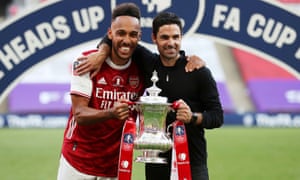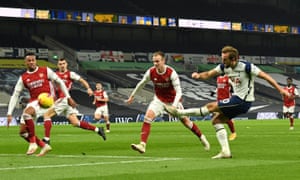As a brisk December breeze swirled through Goodison Park’s stands, a fresh wind was sweeping in at Arsenal. Mikel Arteta looked on from the front row of the directors’ box, flanked by the chief executive, Vinai Venkatesham, and the then head of football, Raul Sanllehi, the day before he officially took charge. He was hardly alone in furrowing his brow during a tedious stalemate between his new side and Everton, who were about to begin their own renewal, but inside his heart was soaring. “I remember sitting in the stands and thinking: ‘I can’t wait to start working with the players and the club,’” he said on Friday.
Exactly 52 weeks later, he will be down in the away dugout. The view will be more immediate and the problems will strike him with greater force, too. Back in late July, when Arsenal were about to win the FA Cup, Arteta joked that he could write a book about his opening half‑year in charge. It would need at least a second volume already and there was certainly cause to sympathise with him this week when he reflected that he has “experienced things in a year that in a normal job you would experience in 10 or eight”.
But the story has taken an unwelcome twist: should 15th-placed Arsenal fall on Saturday, and again when they host Chelsea on Boxing Day, they will almost certainly be within a hair’s breadth of the relegation zone; the bare facts would suggest a reign that promised so much has turned sour more quickly than anyone expected.

“Our recent form in the Premier League is taking the gloss off what we’ve done in the calendar year,” Arteta admitted. They have taken 47 points from the 33 top-flight games he has overseen across this season and last, which would extrapolate to 54 points over a full term and a numbingly dull mid-table finish.
At this natural point for forming judgments, how can we assess Arteta the manager? Is he the quick-learning tyro upon whom borderline genius status was conferred when he lassoed a disconsolate bunch into the right shape to outwit Manchester City and Chelsea at Wembley? Is he an overpromoted upstart whose hype preceded him, ultimately bringing Arsenal’s worst start to a season in 36 years? Or has he been held back, to a considerable extent, by events beyond his grasp, meaning well-informed conclusions must simply wait?
If there is a tendency to look more kindly upon Arteta’s record than visual evidence would suggest he deserves, then it owes much to the tornado he walked into. It has yet to pass fully and may still worsen. Arteta chatted away with Sanllehi up in Everton’s main stand but eight months later his compatriot had departed, having played his part in a dysfunctional transfer policy and the hollowing-out of key recruitment staff. That was the latest executive shake-up of several in the past half-decade and the dust is yet to settle fully.

The club’s struggles to offload a number of disappointing but high-earning performers during the summer have hamstrung his rebuilding efforts significantly, with Sead Kolasinac, Sokratis Papastathopoulos and – glaringly – Mesut Özil not for budging. Those problems are attributable in part to errors made by previous regimes but also, perhaps, to a lack of genuine experience and football business expertise at senior level now.
That is partly why Edu – the technical director, who sits on a four‑man leadership team with Arteta, Venkatesham and the academy manager, Per Mertesacker – was asked on Monday whether any heat the manager is feeling should also apply to him. “It’s not about Edu or Mikel, it’s about stability,” he said in one of several responses that stressed the vast strides being made at Arsenal beneath surface level.
Perhaps he missed the point that stability for stability’s sake is as undesirable as constant flux if the structure is amiss; there is certainly pressure on Edu to ensure arrivals overin the next two windows resemble Thomas Partey and the largely excellent Gabriel Magalhães more than an expensive, ageing Willian, a probably superfluous Pablo Marí and a third-choice right-back in Cédric Soares.
Few around the club would place the manager’s competence foremost among its problems. “The coach is not an issue in the dressing room, there is no criticism of him,” Bernd Leno said after Wednesday’s 1-1 draw with Southampton, which stopped the rot of four straight home defeats if little else, and that reflects the broader mood. But Arteta cannot get away scot-free given Arsenal’s league position did not plumb these depths even under Unai Emery, whose tenure similarly showed promise early on before nosediving. The training ground mood may be perkier than 15 months ago, but that has not stopped familiar errors recurring.
Arteta sought “quick wins” upon his arrival and he got them, but Arsenal are now caught between approaches. They want a blend of ready-made experience and youthful spark but, to give one positional example, Willian has flopped while a younger option on the wing, Reiss Nelson, has barely made a ripple despite being talked up by Arteta early on. Arteta said when outlining his vision for management in 2014 that his sides should be “expressive, entertaining … taking the initiative”, lauding in particular the risk-taking encouraged by his friend Mauricio Pochettino, but Arsenal are miles from that.
Instead they tend to look overcoached, a natural consequence of the discipline Arteta felt needed instilling early on, and fearful of making mistakes. A year ago there appeared sound logic in resolving defensive concerns before allowing those upfield to cut loose: the problem is that simply has not happened, a fact brutally exposed when the goals are not flowing for Pierre-Emerick Aubameyang.
Those issues are hardly news to Arteta. It is why the Lyon playmaker Houssem Aouar was his top target during the summer before a deal for Partey became more straightforward. But he has been dogmatic in refusing to offer the exiled Özil a bone before any creative cavalry arrive and, while that decision trod a thin line between self-sabotage and the common good, the fact it was made speaks volumes for his confidence that Arsenal will give him time.
“We all knew, at least the people who make the decisions knew, that this project wasn’t a quick fix,” he said. “When you are shaking things up, it can take a while.” A glance over to Carlo Ancelotti might remind him that sometimes it does not, even if the obvious riposte is that the Italian is not renowned for leaving behind an underbelly for the long run. Goodison would be the right place for Arteta to show he can balance the two approaches successfully, which he will have to do if his position is to remain secure.
“I haven’t seen anything that goes against what we are trying to do,” he said, referring to the attitude within the club. “But in this industry we need results.” That is the crux of it and, while Arteta’s first year contained an unimaginable number of bumps, the road will become far rockier if they do not start arriving now.
from Football | The Guardian https://ift.tt/38djHxs
via IFTTT

No Comment